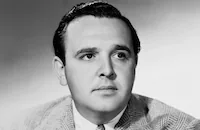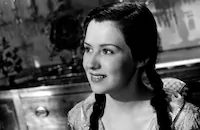Captured on Film: The True Story of Marion Davies
Brief Synopsis
Cast & Crew
Hugh Munro Neely
Mary Collins
George Sidney
Jeanine Basinger
Fred Guiles
Kevin Brownlow
Film Details
Technical Specs
Synopsis
Documentary on actress Marion Davies (1897-1961), whose career was overshadowed by her much-criticized love affair with newspaper magnate William Randolph Hearst. The program chronicles Davies' career and her relationship with Hearst, from their meeting in New York to his death in 1951. Davies began her career as a chorus girl in New York and made her screen debut in 1917 in "Runaway Romany." Around that time, she met Hearst, who took an interest in her career and created a company, Cosmopolitan Pictures, for the sole purpose of producing her films. Their relationship lasted 35 years, and Davies entertained lavishly at the several homes they shared. They never married, as Hearst's wife, Millicent, would never grant him a divorce. Later in their relationship, Davies raised $1 million, almost in a day, to bail Hearst out of financial disaster.
Director
Hugh Munro Neely
Cast
Mary Collins

George Sidney
Jeanine Basinger
Fred Guiles
Kevin Brownlow
Belinda Vidor Holiday

Ruth Warrick
Carl Roup
Constance Moore
Stanley Flink

Charlize Theron
Charles Champlin
Cari Beauchamp
Suzanne Vidor Parry
Virginia Madsen
Lea Sullivan
Bob Board
Crew
Elaina B. Archer
Elaina B. Archer
Elaina B. Archer
Tom Brown
Harry Dawson
John J. Flynn
John J. Flynn
Hugh M Hefner
Adie Hicks
Andie Hicks
Nigel Holton
Dena Krupinsky
Keith Lawrence
Keith Lawrence
Frederick Lawrence Guiles
Hugh Munro Neely
Hugh Munro Neely
Hugh Munro Neely
Marvin Paige
Melissa Poller
Michael Peter Vakaitis
Film Details
Technical Specs
Articles
Captured on Film: The True Story of Marion Davies
While the press and the film Citizen Kane (1941) served to paint Davies as a hard-drinking golddigger with no talent, Captured on Film: The True Story of Marion Davies will reflect her true nature - a talented, hard-working actress and shrewd businesswoman. The documentary chronicles Davies's career and her relationship with Hearst, from their meeting in New York to his death in 1951, and contains rare clips from some of Davies's earliest films, recently rescued from nitrate decomposition, including The Cardboard Lover (1928), The Patsy (1928), When Knighthood Was in Flower. (1922) and Quality Street (1927), as well as rare, never-before-seen home movies from the Hearst castle and from the couple's European travels.
Narrator: Charlize Theron
Director: Hugh Munro Neely
Screenplay: Elaine Archer, Hugh Munro Neely, John J. Flynn
Original Music: Nigel Holton
BW & C-58m.

Captured on Film: The True Story of Marion Davies
Captured on Film: The True Story of Marion Davies
Captured on Film: The True Story of Marion Davies features the final on-camera interview with Davies's biographer Fred Guiles and includes interviews with film historians Kevin Brownlow, Jeanine Basinger, and Cari Beauchamp; former film critic Charles Champlin; and actress Virginia Madsen, who researched Davies for her portrayal of the star in the made-for-TV movie The Hearst and Davies Affair (1985). First-hand accounts of events in Davies's life are shared by Carl Roup, a studio newspaper boy who was chosen by Davies to appear as an extra in The Red Mill (1927); Davies's friends, including actress Constance Moore and King Vidor's daughter, Belinda Vidor Holiday; and Life magazine correspondent Stanley Flink, who taped interviews with Davies in 1951, exerpts from which will be heard as part of TCM's documentary.
While the press and the film Citizen Kane (1941) served to paint Davies as a hard-drinking golddigger with no talent, Captured on Film: The True Story of Marion Davies will reflect her true nature - a talented, hard-working actress and shrewd businesswoman. The documentary chronicles Davies's career and her relationship with Hearst, from their meeting in New York to his death in 1951, and contains rare clips from some of Davies's earliest films, recently rescued from nitrate decomposition, including The Cardboard Lover (1928), The Patsy (1928), When Knighthood Was in Flower (1922) and Quality Street (1927), as well as rare, never-before-seen home movies from the Hearst castle and from the couple's European travels.
Remembrances and observations help to correct the incorrect perceptions of Davies's career and love affair, including Madsen admitting that she felt Davies has never been portrayed correctly on-screen; Flink recounting his observation of Hearst's body being removed from Davies's home to create the illusion that the two were not involved; Roup's stories of Davies's generosity that include her paying for his education; and actual audio recordings of Davies herself, which were thought lost for years.
Davies began her career as a chorus girl in New York and made her screen debut in 1917 in Runaway Romany. Around that time she met Hearst, who took an immediate personal interest in her career, even going so far as to form a company, Cosmopolitan Pictures, for the sole purpose of producing her films. Their relationship lasted 35 years, and Davies entertained lavishly at the several homes they shared. They never married, as Hearst's wife, Millicent, would never grant him a divorce. Later in their relationship, Davies raised $1 million dollars, almost in a day, to bail Hearst out of financial disaster.
The DVD edition of Captured on Film: The True Story of Marion Davies also includes a Marion Davies stills gallery and a bonus film, Quality Street, a 1927 comedy of matters based on the James M. Barrie play that features one of Davies' finest performances.
For more information about Captured on Film: The True Story of Marion Davies, visit Milestone Films. To purchase a copy of Captured on Film: The True Story of Marion Davies, visit TCM's Online Store.
.
by Jeff Stafford













